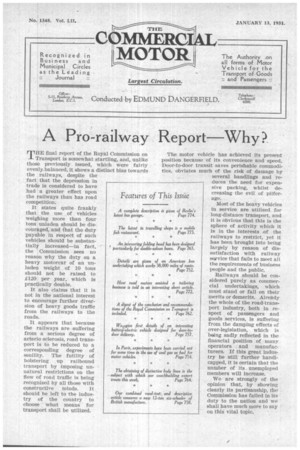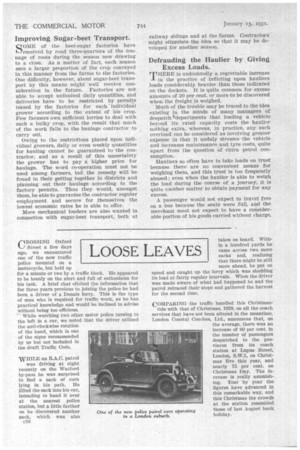A P ro ra il way Report Why?
Page 39

Page 40

If you've noticed an error in this article please click here to report it so we can fix it.
MHE final report of the Royal Commission on Transport is somewhat startling, and, unlike those previously issued, which were fairly evenly. balanced, it shows a distinct bias towards the railways, despite the fact that the depression in trade is considered to have had a greater effect upon the railways than has road competition: It states quitefrankly that the use of vehicles weighing more than four tons unladen should be discouraged, and that the duty payable in respect of such vehicles should be substantially increased—in fact, the Commission sees no reason why the duty on a heavy motorcar of an unladen weight of 10 tons should not be raised to £120 per year, which is practically double.
It also claims that it is not in the national interest to encourage further divnrsion of heavy goods traffic from the railways to the roads.
It appears that because the railways are suffering from a serious degree of arterio sclerosis, road transport is to be reduced to a corresponding degree of senility. The futility of bolstering up railbound transport by imposing unnatural restrictions on the flow of road traffic is being recognized by all those with constructive minds. It should be left to the industry of the country to choose what means for transport shall be utilized. The motor vehicle has achieved its present position because of its convenience and speed. Door-to-door transit saves perishable conunodities, obviates much of the risk of damage by several handlings and re duces the need for expen sive packing, whilst decreasing the evil' of pilferage. .
Most of the heavy vehicles In service are utilized for long-distance transport, and it is obvious that this is the sphere of activity which it is in the interests of the railways to restrict, yet it has been brought into being largely by reason of dissatisfaction with railway seivice that fails to meet all the requirements of business people and the public.
Railways should be considered purely as commercial undertakings, which must stand or fall on their merits or demerits. Already the whole of the road-transport industry, both in respect of passengers and goods services, is suffering from the damping effects of over-legislation, which is being sadly reflected in the financial position of many operators and manufacturers. If this great industry be stillfurther handicapped, it is certain that the number of its unemployed members will increase.
We are strongly of the opinion that, by showing clearly its partisanship, the Commission has failed in its duty to the nation and we shall have much more to say ' on thisvital topic.
Improving Sugar-beet Transport.
SOME of the beet-sugar factories have L./received by road three-quarters of the tonnage of roots during the season now drawing to a close. As a matter of fact, each season sees a larger proportion of the crop conveyed in this manner from the farms to the factories. One difficulty, however, about sugar-beet transport by this means might well receive consideration in the future. Factories are not able to accept unlimited daily quantities, and deliveries have to be restricted by permits issued by the factories for each individual grower according. to the extent of his crop. Few farmers own sufficient lorries to deal with such a bulky crop, with the result that much of the work falls to the haulage contractor to carry out. Owing to the restrictions placed upon individual growers, daily or even weekly quantities for hauling cannot be guaranteed to the contractor, and as a result of this uncertainty the grower has to pay a higher price for haulage. The word co-operation must not be used among farmers, but the remedy will be found in their getting together in districts and planning out their haulage according to the factory permits. Thus they would, amongst them, be able to guarantee the contractor regular employment and secure for themselves the lowest economic rates he is able to offer.
More mechanical loaders are also wanted in connection with sugar-beet transport, both at railway sidings and at the farms. Contractors might stimulate the idea so that it may be developed for another season.
Defrauding the Haulier by Giving Excess Loads.
THERE is undoubtedly a regrettable increase in the practice of inflicting upon hauliers loads considerably heavier than those indicated on the dockets. It is quite common for excess amounts of 20 per cent. or more to be discovered when the freight is weighed. Much of the trouble may be traced to the idea existing in the minds of many managers of despatch Idepartments that loading a vehicle beyond its rated capacity costs the haulier nothing extra, whereas, in practice, any such overload can be considered as involving greater expense in that it unduly stresses the vehicle and increases maintenance and tyre costs, quite apart from the question Of extra petrol consumption.. Hauliers so often have to take loads on trust because there are no convenient means for weighing them, and this trust is too frequently abused ; even when the haulier is able to weigh the load during the course of a journey, it Is quite another matter to obtain payment for any excess.
A passenger would not expect to travel free on a bus because the seats were full, and the merchant must not expect to have a considerable portion of his goods carried without charge.












































































































